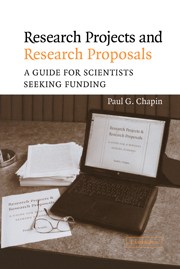Book contents
- Frontmatter
- Contents
- Foreword
- Acknowledgments
- Introduction
- 1 Selecting a Research Topic
- 2 Project Planning
- 3 Identifying Funding Sources
- 4 Special Funding Mechanisms
- 5 Writing a Proposal
- 6 Research Ethics and Responsibilities
- 7 The Natural History of a Proposal
- 8 “We Are Happy/Sorry to Inform You …”
- 9 Managing Your Grant
- Appendix A Glossary of Acronyms
- Appendix B Useful URLs
- Index
6 - Research Ethics and Responsibilities
Published online by Cambridge University Press: 14 July 2009
- Frontmatter
- Contents
- Foreword
- Acknowledgments
- Introduction
- 1 Selecting a Research Topic
- 2 Project Planning
- 3 Identifying Funding Sources
- 4 Special Funding Mechanisms
- 5 Writing a Proposal
- 6 Research Ethics and Responsibilities
- 7 The Natural History of a Proposal
- 8 “We Are Happy/Sorry to Inform You …”
- 9 Managing Your Grant
- Appendix A Glossary of Acronyms
- Appendix B Useful URLs
- Index
Summary
When you conceive of a research project, and design it, and propose it to a funding agency, you take on some obligations. As the intellectual progenitor of the project, you are accountable for its scientific soundness. You also have a broader set of ethical and administrative responsibilities, which we will explore in this chapter. They pertain to all stages of the project: writing a proposal, carrying out the research, and reporting on the results.
Scientists have always understood that they are subject to a set of ethical constraints and expectations. For a very long while, these were taken as implicit, an unwritten code of behavior that new people entering the field would absorb in informal ways, through their interactions with established professionals. A number of well-publicized cases of scientific misconduct in recent years, however, have suggested the need for a more explicit set of rules, with enforcement mechanisms. There is now a substantial and growing body of regulations governing the conduct of research. These are still a work-in-progress, evolving amid ongoing debate among scientists about the tradeoffs between freedom of inquiry and effective research, on the one hand, versus the need to ensure that the research does no harm, on the other. The principles that we will discuss in this chapter are basic enough that they are likely to survive, but the ways of interpreting and implementing them may evolve over time, and new ones may emerge.
- Type
- Chapter
- Information
- Research Projects and Research ProposalsA Guide for Scientists Seeking Funding, pp. 98 - 108Publisher: Cambridge University PressPrint publication year: 2004



